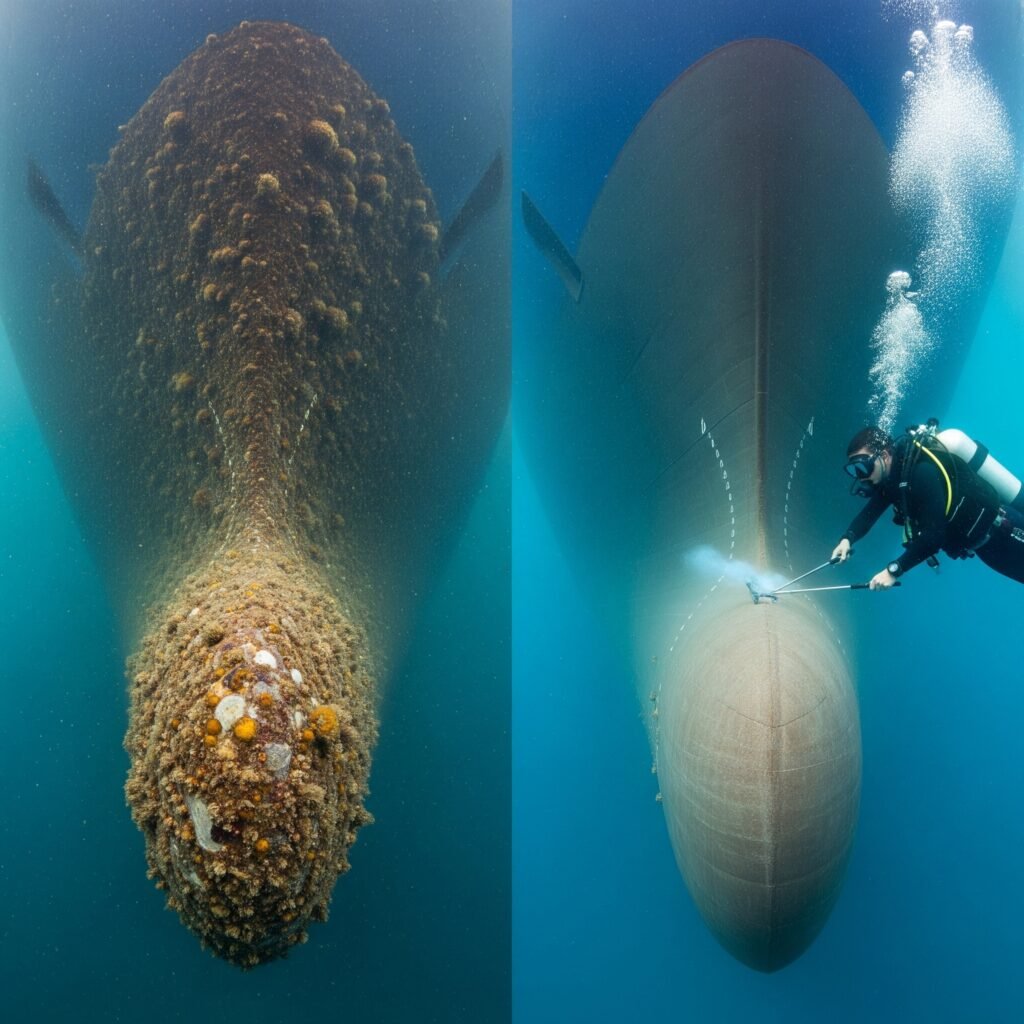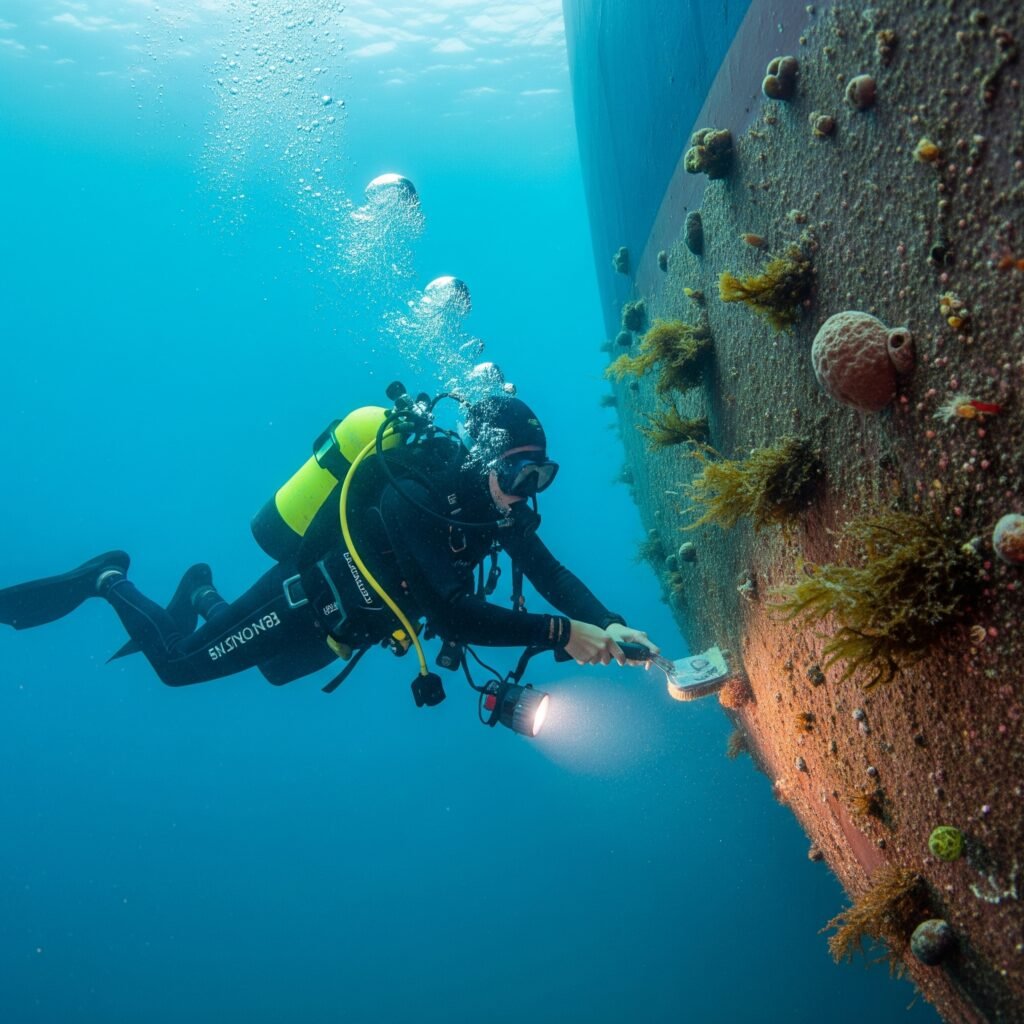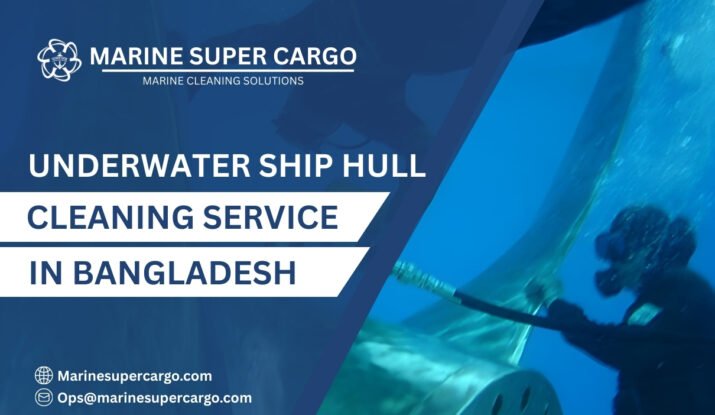Underwater ship hull cleaning in Bangladesh is crucial to the nation’s growing maritime economy. With major ports like Chittagong, Mongla, and Payra handling significant shipping traffic, Bangladesh is becoming a key player in South Asian trade and logistics. As the country advances its blue economy initiatives, efficient and eco-friendly maritime operations are essential. Regular underwater ship hull cleaning helps maintain vessel performance, improve fuel efficiency, and extend lifespan by preventing biofouling, ensuring ships operate smoothly and sustainably in the region’s busy waters.
What is Underwater Ship Hull Cleaning in Bangladesh?
Underwater ship hull cleaning in Bangladesh refers to the process of removing marine organisms, algae, barnacles, and other debris that attach to the parts of a vessel’s hull. This cleaning is performed while the vessel is still in the water, typically by professional divers or Remotely Operated Vehicles (ROVs) equipped with brushes and suction devices.
Difference Between Underwater and Dry-Dock Cleaning
- Underwater Cleaning: Conducted without bringing the vessel to a dry dock. It is faster, more cost-effective, and reduces downtime.
- Dry-Dock Cleaning: Involves moving the vessel into a dry dock, lifting it out of the water, and performing extensive inspection and cleaning. This is more thorough but expensive and time-consuming.

Tools and Equipment Used
- Rotating brushes
- Hydraulic or pneumatic scrapers
- High-pressure water jets
- ROVs
- Full-gear certified divers
Why Underwater Ship Hull Cleaning in Bangladesh is Important
When marine growth increases resistance or “drag” on the hull, the engine must work harder, burning more fuel. Regular cleaning can improve fuel efficiency by up to 15-20%, reducing operating costs significantly.
Reduces Marine Biofouling and Invasive Species
Cleaning helps prevent the transport of invasive marine species between ports—a growing concern globally. These organisms can harm local marine ecosystems, leading to ecological and economic damage.
Regulatory Compliance
Agencies such as the International Maritime Organization (IMO) and MARPOL require vessels to maintain clean hulls to minimize environmental impact. Non-compliance can lead to heavy fines and detention at ports.
Prevents Corrosion and Structural Damage
Biofouling can accelerate galvanic corrosion, damaging the hull over time. Regular cleaning protects the structural integrity of the ship and avoids costly repairs.
The State of Underwater Ship Hull Cleaning in Bangladesh
Market Overview
With increased maritime traffic and Bangladesh’s push to expand its shipping sector, the demand for underwater ship hull cleaning in Bangladesh is growing. The country is investing in port infrastructure, and private players are entering the market with modern solutions.
Key Ports and Service Zones
- Port of Chittagong: The busiest and largest port, serving as the primary hub for underwater ship hull cleaning in Bangladesh.
- Mongla Port: Increasing in prominence due to its strategic location near the Sundarbans.
- Payra Port: An emerging port with growing cleaning and maintenance activities.
Growth in the Blue Economy
Underwater ship hull cleaning in Bangladesh contributes to the blue economy by:
- Enhancing vessel efficiency
- Promoting sustainability
- Generating employment for trained divers and marine engineers
Challenges Faced in Underwater Ship Hull Cleaning in Bangladesh
While global trends move toward automated ROVs, Bangladesh’s adoption is still in the early stages. Manual diver-based cleaning is predominant, which may limit speed and scalability.
Lack of Certified Divers and Training
There is a shortage of internationally certified divers, and many professionals lack access to continuous training programs, which hinders service quality.
Environmental and Legal Constraints
Improper cleaning techniques can harm marine life or breach environmental laws. There is a pressing need for standardized environmental protocols.
Cost and Accessibility
Smaller shipping companies often cannot afford frequent cleanings. Making services affordable without compromising quality remains a challenge.
Innovations and Eco-Friendly Practices
These coatings reduce the rate of marine growth and make cleaning easier. They are free from harmful biocides, unlike traditional coatings.
Biodegradable Cleaning Materials
Some providers are shifting to biodegradable cleaning agents, which reduce environmental impact during in-water operations.
Public-Private Collaboration
Bangladesh’s Ministry of Shipping and private maritime firms are beginning to collaborate on sustainable practices and infrastructure upgrades to support marine services.
How to Choose a Reliable Partner for Underwater Ship Hull Cleaning in Bangladesh
Red Flags
- Lack of verifiable past clients or projects
- No compliance with environmental standards
- Low-cost offers with no quality guarantee
Vessel Efficiency Boost After Cleaning in Chittagong
In 2023, a bulk carrier undergoing hull cleaning by CleanShip Bangladesh at Chittagong Port reported measurable improvements:
- Fuel consumption dropped by 18%
- Cruising speed increased by 1.2 knots
- Biofouling removed: 6mm layer of barnacles and algae
- Complied with IMO biofouling management guidelines
The Future of Underwater Ship Hull Cleaning in Bangladesh
Technological Advancements
- Greater use of AI-driven underwater drones
- Remote monitoring systems for fouling detection
- Cloud-based performance tracking dashboards
Sustainable Shipping
Clean hulls lead to lower emissions, contributing to carbon neutrality goals set by the IMO for 2050. Bangladesh’s ship maintenance sector will play a crucial role in achieving this.

Government Initiatives and Policy Support
Policies supporting:
- Training and certification programs
- Investment in cleaning infrastructure
- Subsidies for smaller shipping operators
International partnerships with countries like Norway and Japan in maritime sustainability are expected to enhance local capabilities.
Conclusion
Underwater ship hull cleaning in Bangladesh is not just a routine maintenance task—it’s a strategic imperative for Bangladesh’s maritime industry. It enhances operational efficiency, ensures environmental compliance, and supports the vision of a sustainable blue economy.
As the shipping industry expands, vessel owners must invest in regular underwater ship hull cleaning to remain competitive and eco-conscious. With growing capabilities and market demand in Bangladesh, the time is ripe to embrace this service with modern, safe, and green methods.
FAQ:
Q1. Can hull cleaning improve fuel consumption?
Yes, hull cleaning can improve fuel efficiency by up to 20%. Removing drag-causing biofouling means engines work less to maintain speed, which reduces fuel usage and emissions.
Q2. Is it mandatory to clean the hull before inspection or dry-docking?
Many shipowners choose to clean the hull before port state inspections or dry-docking to pass compliance checks, improve documentation, and reduce repair time.
Q3. What are the environmental risks of underwater ship hull cleaning in Bangladesh?
If not properly managed, hull cleaning can release biofouling waste into the ocean, potentially introducing invasive species or harming marine life.
Q4. Does underwater cleaning damage the hull’s coating?
When done professionally with the right tools and techniques, it does not damage the antifouling paint.
Q5. Is underwater ship hull cleaning allowed in all Bangladeshi ports?
Yes, underwater ship hull cleaning in Bangladesh is permitted in major ports like Chittagong and Mongla, provided it complies with environmental regulations.


